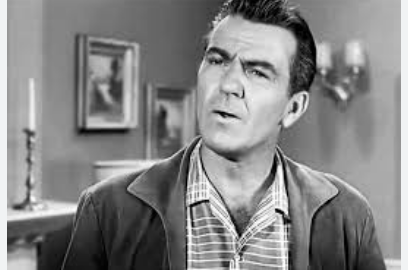In 1957, the sitcom Leave It to Beaver was introduced to American households, and the audience was introduced to a good father whom they could depend on, Ward Cleaver. Hugh Beaumont played that character, and his life and work were well beyond the television screen. Beaumont grew up in humble conditions, studied theology and drama, and made a career that intertwined faith, family values and entertainment to a large number of people. This paper provides the account of his childhood, significant positions, his beliefs, and his life. It is written in comprehensible language and is directed to any reader that wants to know how a single man was able to influence the image of the television father- and what he did when the cameras stopped shooting.
Who Was Hugh Beaumont?
Childhood and Family History. On February 16, 1909 Hugh Beaumont was born as Eugene Hugh Beaumont in Kansas -the city was given either as Lawrence or the neighboring Eudora. Edward H. Beaumont, a travelling salesman was his father, and his mother was Ethel Adaline Whitney.
He studied at the University of Chattanooga where he played football then graduated in the year 1930. He later enrolled in the University of Southern California to pursue a Master of Theology which he graduated in 1946.
Hugh Beaumont biography
| Category | Details |
|---|---|
| Full Name | Eugene Hugh Beaumont |
| Born | February 16, 1909 – Kansas (Lawrence or Eudora), USA |
| Parents | Edward H. Beaumont (father), Ethel Adaline Whitney (mother) |
| Education | University of Chattanooga (B.A., 1930); University of Southern California (Master of Theology, 1946) |
| Occupation | Actor, Director, Writer, Methodist Lay Minister, Farmer |
| Years Active | 1940–1970 |
| Famous Role | Ward Cleaver in Leave It to Beaver (1957–1963) |
| Spouse | Kathryn Adams (m. 1941–div. 1974) |
| Children | Hunter, Mark, and Kristy Beaumont |
| Notable Films | The Blue Dahlia (1946), Blonde for a Day (1946), The Mole People (1956) |
| Other Ventures | Operated a Christmas-tree farm in Minnesota; directed community theatre |
| Religious Role | Licensed Methodist lay minister |
| Health | Suffered a stroke in 1970 |
| Death | May 14, 1982 – Munich, West Germany (aged 73, heart attack) |
| Legacy | Known as one of TV’s most iconic father figures; ranked among TV Guide’s 50 Greatest TV Dads |
Transition Into Acting
Beaumont, despite his training as theologian and his solid religious background, entered the entertainment world in the early 1930s: theatres, radio, night clubs, -he earned his spurs as an entertainer. By 1940 he was in the film industry, with minor appearances or having no credit, and slowly establishing himself as an actor.
Hugh Beaumont Career
Film Work in the 1940s Beaumont had appeared in film noirs, crime movies and B-movies before becoming a television name. As an example, he acted in a number of films as detective Michael Shayne between 1946-47. Pieces that he had performed were uncredited in the early part of the decade.
TV Discovery
The major breakthrough came when in 1957 –1963 (234 episodes) Beaumont starred as Ward Cleaver in the television series Leave It to Beaver. His personality was turned out to be an ideal father figure to many audiences. He also directed episode in subsequent seasons.
Later Work and Other
Once the show had concluded, Beaumont went back to playing guest roles in shows such as Mannix, The Virginian amongst others. He also resorted to writing (television scripts, radio scripts) and community theatre directing. Later on, he operated a Christmas-tree farm in Minnesota as well.
Year Title Role Notes
- 1946 The Blue Dahlia George Copeland Supporting part in a film noir.
- 1946 Blonde for a Day Michael Shayne Detective movie.
- 1956 The Mole People Dr. Jud Bellamin Science-fiction movie.
- 1957-63 Leave It to Beaver Ward Cleaver TV sitcom (234 episodes)
- 1969 Mannix (TV guest) Hammond Post-sitcom guest role.
Table: Career Milestones
Master of Theology 1946 -Demonstrated his interest in ministry and faith. Plays Ward Cleaver 1957 Plays his most popular TV role. Christmas-Tree Farm At the beginning of 1970s Diverted attention to a different business. Stroke 1970 Stroke that limited his work. Died on May 14 1982 Death at age 73.
Personal Life, Faith and off screen Ventures.
Family and Relationships
On April 13, 1941, Beaumont got married to Kathryn Adams, an actress. They were parents of three children; sons Hunter and Mark and daughter Kristy. The marriage lasted until 1974.
Faith and Ministry
True to his theology background, Beaumont was a licensed Methodist lay-minister, and at times claimed that his acting activity would interfere with his ideals as a clergyman. His religion was not a mere hobby but it was part of his personality.
Business Activities Out
Less expectedly, Beaumont bought and operated a Christmas-tree farm near Grand Rapids, Minnesota, selling some of its trees to California.He also later directed local theatre in Minnesota.
Health and Final Years
In 1970 Beaumont was stricken with a stroke that incapacitated him and prevented him acting as a fulltime profession. He died of a heart attack on May 14, 1982, a day after he had visited his son in Munich, West Germany. He was 73 years old. Why Hugh Beaumont Matters Today.
The Iconic TV Father Figure
Beaumont, as TV was fairly new, had created a father, Ward Cleaver, who became a cultural point of contact with the idea of being a father, a kind of father who is approachable, calm and wise. That role contributed to the common concept of what a television dad can be.
Range and Versatility
The career of Beaumont filled with film noir, detective series, science-fiction, directing and writing, was best known by the sitcom role. Such diversity is important in looking at the whole of his work.
Influence Beyond Screens
His religious and ministry, his business (such as the tree farm) and how he resurfaced after a stroke demonstrate that he is more than an actor. All of these give him credibility and humanity.
Table: The Areas of his Legacy
Television father archetype Ward Cleaver role was an inspiration to other TV fathers. Career combinations Actor, minister, writer, farmer. Religion in the community life Open about balancing between acting and individual ethics. Resilience Did not succumb to a stroke, changed careers, continued working.
Health Setbacks
As mentioned, Beaumont had to cut down his work drastically due to a stroke that occurred around 1970. Certain physicians thought that he may never walk, or speak again–but he got well enough to play in the local theatre and directing.
Typecasting Risks
Due to close relation to Ward Cleaver, Beaumont was to be typecast. Despite his diverse career, he was always known by most of the viewers as the sitcom father.Adversities and Facts of Minor Significance.
The Tree Farm Episode
That might sound strange of a television star operating a tree farm but Beaumont accepted that change. Beaumont was kind-hearted off-screen, as a local Minnesota farmer remembered that Beaumont was pleasant and down to earth, very generous.
Recognition and Legacy
The magazine TV Guide in 2014 named Ward Cleaver (the character that Beaumont portrays), as its 28th on its 50 Greatest TV Dads of All Time.Media and Culture Hugh Beaumont Legacy.
Impression on Future
Television dads refer to the relaxed style of leadership that Ward Cleaver had. The character that Beaumont created provided a model: intelligent, even-handed, tough but affectionate.
Preservation of His Work
Most of his work may be out of date in style or location, but series such as Leave It to Beaver continue to be broadcast on various shelf or streaming platforms, allowing soon generations to experience his performance. His minor movies provide an insight into the history of film during the middle of the 20 th century as well.
Table: Legacy References
TV Dad Rankings TV Guide List of Greatest TV Dads. Media articles Biographies of his life in the newspapers and internet websites. Cultural commentary Cultural representations of fatherhood in media. Movie/TV Archiving Restoration of his older movies and shows.
What Viewers and Fans Could Learn
Valuing consistency: Beaumont added a calming and constant nature to most of his roles.
Worth of a multifaceted life: The fact that he is a combination of faith, acting, writing and farming proves that individuals may change the directions.
Knowing television history: A chapter of early television, film-to-TV transition, and the development of father figures is filled with his career.
Health resilience reminder: Beaumont did not stop his career because of his stroke; he changed.
Conclusion
The name Hugh Beaumont could be linked to a fairly memorable television father Ward Cleaver, yet he has a more diverse story than that. In Kansas, and in California and Minnesota, in the studio sets, and on an Indiana farm, in the role of actor and in the role of minister, his life was an adventure in various fronts–on and off the screen. His character of Ward Cleaver provided a picture of how a father should be through generations and his life demonstrated resoluteness, belief and flexibility.
And we think of Hugh Beaumont, and we think of more than an actor. We recall a man who was able to juggle between art and conviction, the image in the market, and personal principles, and mark his name in the entertainment sphere as well as in life. His work lives on through reruns, film archives and how we conceptualize fatherhood in the media.
FAQs
1.Who was Hugh Beaumont?
Hugh Beaumont was an American actor and television director born in 1909 and was known as an actor who played a role of Ward Cleaver in a sitcom Leave It to Beaver.
2.So what was the role of Hugh Beaumont on Leave It to Beaver?
Hugh Beaumont played Ward Cleaver, the considerate and affectionate father of a suburban family in 234 episodes in 1957-1963 on Leave It to Beaver.
3.Was Hugh Beaumont not in another career other than acting?
Yes. Beaumont was the licensed Methodist lay-minister, an author and it was in his subsequent life that he managed a Christmas-tree farm in Minnesota.
4.What became of Hugh Beaumont in his adulthood?
He was stroke-stricken in the year 1970 and was henceforth restricted in his acting activity. He died on May 14 1982 in Munich, Germany, where he died at the age of 73 due to a heart attack.
5.What was the reason that Hugh Beaumont could be recalled?
He is still known as the father of TV in a historically significant time in television history, his diverse career, and demonstrating how an actor can enable ethics, faith and personal-to-public work to be intertwined.











Leave a Reply